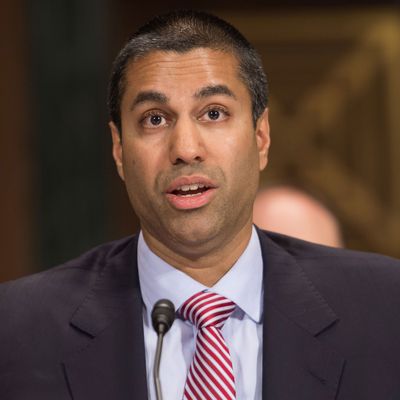
The Trump administration yesterday named Republican Ajit Pai to head the Federal Communications Commission. Pai’s appointment was a foregone conclusion, given that he is the ranking Republican on the five-member body, but it’s important for one reason: Pai is an outspoken critic of net neutrality — one of the fundamental principles of the free, open internet we’ve all been using for the past several decades.
During the Obama administration, the commission was headed by Tom Wheeler, a Democrat who most famously used his majority to pass what is informally known as the Open Internet Order. That order classified broadband internet as a telecommunications utility, though did not subject internet-service providers to the intense regulations that other common carriers often are.
The Open Internet Order bolsters a principle known as net neutrality (the specific term was coined by law professor Tim Wu in 2003). To understand it, we need to first understand how the internet works. The internet is literally a network of data cables that crisscross the globe. When you open your computer, say, you connect to a network most likely owned by one of a handful of private internet-service providers — the dreaded Comcast, Time Warner, and so on. (Same thing on your iPhone: Thanks to smartphones, cellular providers like Verizon Wireless and T-Mobile are also ISPs.) That network communicates with the networks owned and operated by other ISPs, and those owned by a handful of other organizations — government bodies, academic institutions, and independent nonprofits, generally — and those many, global, interconnected networks, some public, some private, make up the internet.
The internet took off, as did the World Wide Web which rests on top of it, because it’s “open.” In other words, if you’re connected to Comcast, you can send data to someone connected via Time Warner, without issue or negotiation. Neither Comcast nor Time Warner is allowed to (or able) to slow down or speed up your connection — or, for that matter, cut it off. Unlike phone service, you don’t have things like long-distance fees either.
Perhaps the single most important aspect of the internet as it was first conceived is that it was designed as a “dumb pipe,” or one that does not give priority to certain types of data or certain sources of said data. Video of a presidential speech gets the same bandwidth as video of a dude getting hit in the nuts.
Market conditions change, however, and the unchallenged freedom under which the internet blossomed is now regarded as a liability for the ISPs — which are, as you probably have experienced, de facto monopolies. If we own the highway, their thinking goes, why can’t we charge tolls? To that end, some have proposed so-called “fast lanes” for companies willing to pony up for faster bandwidth.
In practice, this could radically change our experience of the internet. For example, if Netflix cuts a deal with Verizon for a fast lane and Hulu doesn’t, Hulu loads more slowly, and users would presumably favor Netflix. More likely than that is that video-streaming services owned and operated by the ISPs themselves get preference over independent streaming services. This is a clear pay-to-play system in which an upstart little guy could easily get crowded out by industry incumbents. The most extreme scenario would be one in which businesses have to pay in order to get onto an ISP’s network at all — imagine, let’s say, SBC customers can’t access Google because the company refuses to pay SBC for access.
Mobile carriers have inverted this concept through what is known as “zero-rating,” in which certain services don’t count toward a customer’s data cap. A choice between a service that would use up your limited data or one that doesn’t is hardly a choice at all.
The Open Internet Order, adopted in February 2015, banned paid prioritization of traffic, as well as blocking or throttling traffic to legal internet content.
The net-neutrality debate is about whether one class of private entities, ISPs, should be regulated in order to allow millions of other private entities, users and businesses operating online, to operate freely. Pretty much everyone agrees that they should — except for the ISPs … and Ajit Pai. Pai even wrote a 67-page(!) dissent when the order was adopted. Even Google and Facebook support the principle, in part because they often buy up the smaller startups that flourish on an unfettered internet. Imagine an internet where, rather than buying Instagram for $1 billion, Facebook instead paid for a fast lane and forced Instagram out by other means.
The past decade has been defined by a trend of centralization — the collection of everything under the umbrellas of a few giant companies. The end of net neutrality will only increase this, as companies will be given more latitude to block services that don’t fit their revenue model.
Soon, Pai will be in charge of the FCC, and he has said that net neutrality’s “days are numbered.” If you think your internet-service provider is horrible now, just wait until there’s no regulatory body watching them.





























